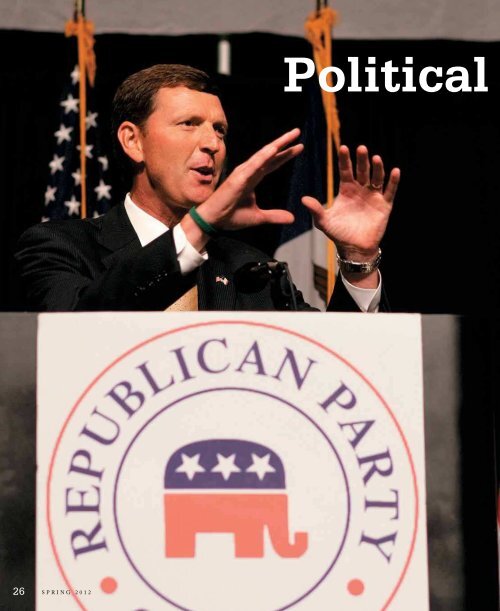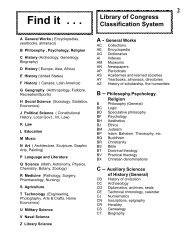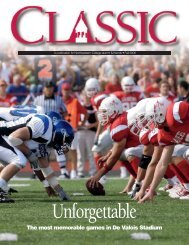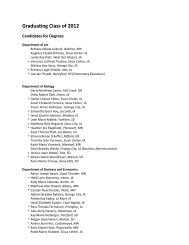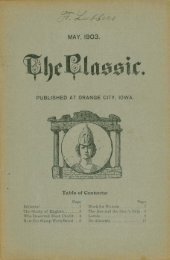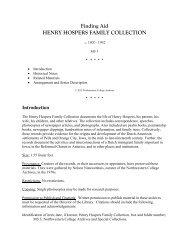Following Jesus - Northwestern College
Following Jesus - Northwestern College
Following Jesus - Northwestern College
Create successful ePaper yourself
Turn your PDF publications into a flip-book with our unique Google optimized e-Paper software.
Iowa’s Bob Vander Plaats influences presidential race<br />
by Duane Beeson<br />
As national media converged upon Iowa in the months leading up<br />
to the first-in-the-nation presidential caucuses, Bob Vander Plaats ’85<br />
was called “Iowa’s social conservative king” by Time magazine, the state’s<br />
“go-to guy” by the Wall Street Journal, and one of the country’s 10 most<br />
coveted endorsements by The Hill.<br />
By the time the candidates and media had moved on to South<br />
Carolina and Florida, those labels seemed to have been accurate. Vander<br />
Plaats announced his endorsement of Rick Santorum two weeks prior to<br />
the Iowa caucuses, at a time when the former Pennsylvania senator was<br />
polling about 5 percent. Santorum was eventually declared Iowa’s winner<br />
with 24.6 percent of the vote.<br />
“There is no question Bob made a difference,” says Jamie Johnson,<br />
Santorum’s Iowa coalitions director. “His endorsement helped put us over<br />
the top.”<br />
In a congratulatory phone call, Donald Trump gave Vander Plaats<br />
some friendly chastising when the Iowan deflected praise for Santorum’s<br />
victory. “Have you ever watched my show?” asked the star of The<br />
Apprentice. “You should take the credit.”<br />
Vander Plaats’ rise to political power broker wasn’t foreseen by those<br />
who knew the lanky Sheldon, Iowa, native decades ago. B.J. Mulder ’85,<br />
one of his Red Raider basketball teammates, saw in Vander Plaats strong<br />
leadership qualities, a good dose of confidence and an unparalleled work<br />
ethic, but he didn’t envision him as a politician. “He was always very<br />
passionate. You knew whatever he decided to do, he was going to give it<br />
110 percent.”<br />
Vander Plaats embarked upon a career in education. In 1993, while he<br />
was principal of Marcus-Meriden-Cleghorn High School, the Iowa Civil<br />
Liberties Union filed suit against MMC and another school district to<br />
try to prevent student-initiated commencement prayers. Vander Plaats<br />
recalls being grilled for an hour on the stand in federal district court,<br />
with the judge focusing on his background as a graduate of Christian<br />
schools. “He thought my purpose was to proselytize,” he says. The<br />
districts won on appeal two days before graduation.<br />
That year, Vander Plaats and his wife, Darla (Granstra ’85), welcomed<br />
their third of four sons. Lucas was born with a severe, rare brain disorder.<br />
Today Vander Plaats calls him a “dynamic blessing. If it hadn’t been for<br />
the miracle of Lucas, we would have never looked beyond where we<br />
were.”<br />
A few years later, Vander Plaats became CEO of Opportunities<br />
Unlimited, a Sioux City agency that provides rehabilitative services for<br />
individuals with disabilities such as brain or spinal cord injuries. While in<br />
that role, Vander Plaats was appointed to the state’s Advisory Council on<br />
Brain Injuries.<br />
Vander Plaats’ insight into government’s role in education and human<br />
services ignited a new interest in politics. “I saw us funding bureaucracy,<br />
not needs. Too often it didn’t make sense philosophically and wasn’t<br />
smart economically. I felt the state needed leadership from the outside.”<br />
He ran unsuccessfully for the Republican gubernatorial nomination<br />
in 2002. He also ran in 2006, until he withdrew to become Jim Nussle’s<br />
running mate in another losing effort. In 2010, he ran again and garnered<br />
41 percent of the vote, losing to Terry Branstad.<br />
Normally, Vander Plaats admits, losing candidates lose influence. But<br />
he gained some clout when he chaired Mike Huckabee’s surprising win<br />
in the 2008 Iowa caucuses. And he parlayed his conservative credentials<br />
into a successful 2010 campaign to ouster three members of the Iowa<br />
Supreme Court who had voted to overturn Iowa’s Defense of Marriage<br />
Act, resulting in the legalization of same-sex marriages.<br />
After the vote, Vander Plaats became president of the Family<br />
Leader, an umbrella organization that includes groups such as the Iowa<br />
Family Policy Center and a political action committee. The Family<br />
Leader organized a lecture series that brought most of the Republican<br />
presidential candidates to voters across the state and a forum in which<br />
the candidates talked about family values in front of an audience of<br />
2,500.<br />
Vander Plaats says the pillars of his organization’s pro-family views<br />
are the sanctity of human life, God’s design for one-man/one-woman<br />
marriage, preservation of the Constitution, and economic freedom.<br />
Vander Plaats has his share of detractors, both from the left and from<br />
his own party. He’s been called a bully and a bigot—even a “poodle<br />
trainer”—and he’s received death threats. Some prominent Iowa<br />
Republicans claim his focus is on building his own brand.<br />
Shortly after he endorsed Santorum, allegations surfaced that he had<br />
asked Michelle Bachmann to drop out of the race and that he sought<br />
money in exchange for his endorsement—both of which he denied.<br />
Like a star three-point shooter who’s constantly double-teamed,<br />
Vander Plaats understands that verbal barrages and accusations are part<br />
of the game for those willing to take controversial stands in the public<br />
square. He responds by taking comfort in Scripture, counseling his family<br />
not to read the blogs, and recalling a phrase he’s often repeated: “You’ll<br />
never be wrong when you do what’s right.”<br />
And he enjoys remembering a speaking engagement he had on<br />
a college campus. A lesbian student spoke up at an open mic time,<br />
disagreeing with his viewpoint on same-sex marriage. Vander Plaats says<br />
he walked her through why everyone needs to be concerned about the<br />
dangers of judicial activism. “I talked about the process the judges used<br />
to reach their decision—that they would eventually reach conclusions<br />
through that process that she couldn’t agree with. By the end of our time<br />
together, she told a reporter, ‘He’s way different than I thought. I could<br />
vote for him.’”<br />
26 SPRING 2012<br />
<strong>Northwestern</strong> Classic 27


